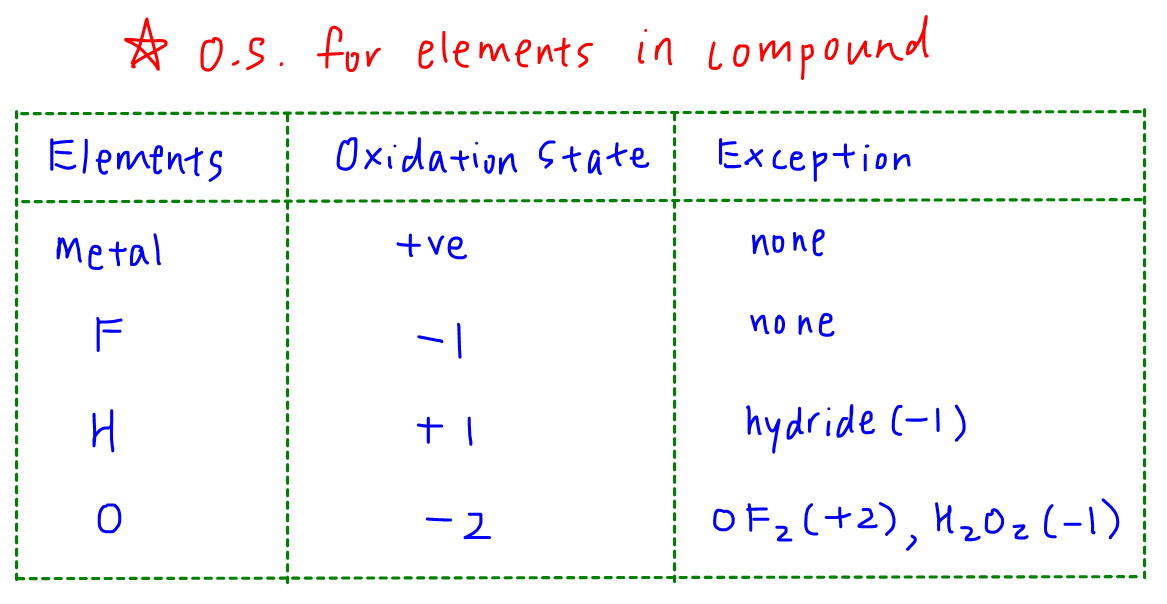Determine Oxidation State or Oxidation Number
One very important type of reaction in Chemistry is Redox reactions, where there is a change in oxidation state or oxidation number of elements.
In this video created by Chemistry Guru, Singapore's leading JC Chemistry tuition centre, we want to define what Oxidation State or Oxidation Number is, and learn how to determine the oxidation state of common elements in compounds.
Definition of Oxidation State or Oxidation Number
For ionic compounds, the oxidation state of an element is the charge of the ion of that element.
For instance in sodium chloride NaCl, charge of Na is +1 hence oxidation state of Na is +1; and charge of Cl is -1 so oxidation state of Cl is -1.

For another example magnesium chloride, charge of Mg is +2 hence oxidation state of Mg is +2; and charge of Cl is -1 so oxidation state of Cl is -1.

For covalent compounds, the oxidation state of an element is the hypothetical charge of that element if it were an ion.
We need to consider the difference in electronegativity, which is the affinity to electrons in a covalent bond, and decide what charges each element will possess if all covalent bonds are broken to form ions.
When a covalent bond is broken, the electrons will be transferred to the more electronegative element which can pull the electrons closer to itself.
Therefore the negative charge is assigned to the more electronegative element, while the positive charge is assigned to the less electronegative element.
For example HCl, Cl is more electronegative than H so the bond pair of electrons will be closer to Cl. When the bond is broken, the electrons will go to Cl.
Hence charge and oxidation state of H is +1; while charge and oxidation state of Cl is -1.

Let's look at chlorine molecule Cl2 next, but do take note Cl2 is not a compound but an element.
Since there is no difference in electronegativity in the Cl-Cl bond, the electron pair will be exactly at the centre of the bond.
When the covalent bond is broken, each Cl will take back its own electron to form neutral Cl atoms where the charge is zero.
This is the reason why the oxidation state of elements is always zero.

Oxidation State for Common Elements in Compounds
We can use the following table to remember the oxidation states of some common elements that are relatively unchanged.

Take note of the following oxidation states:
- metals will always have positive oxidation states according to their valency
- fluorine will always have -1 oxidation state
- hydrogen will always have +1 oxidation state, unless it's bonded to a metal then it'll be -1 oxidation state
- oxygen will always have -2 oxidation state, unless it's bonded to more electronegative fluorine, or in hydrogen peroxide (H2O2) where oxidation state is -1
We can use these common oxidation states as a reference to determine the oxidation states of other elements in a given compound.
Take a look at the following 3 examples. Can you determine the oxidation states of these elements?

For the detailed discussion of determining oxidation states, and to find out the answers to the examples, check out this video!
Topic: Redox Reactions, Physical Chemistry, A Level Chemistry, Singapore
Back to other previous Physical Chemistry Video Lessons.
Found this A Level Chemistry video useful?
This free chemistry video lesson is brought to you by Chemistry Guru, Singapore's reputable A Level Chemistry tuition centre since 2010.
Please like this video and share it with your friends!
Join my 19,000 subscribers on my YouTube Channel for new A Level Chemistry video lessons every week.
Check out other A Level Chemistry Video Lessons here!
Need an experienced tutor to make Chemistry simpler for you?
Do consider signing up for my A Level H2 Chemistry Tuition classes at Bishan or online chemistry classes!
